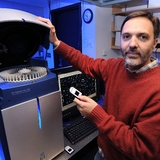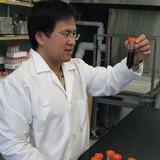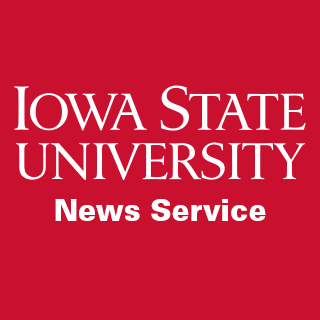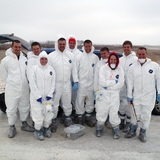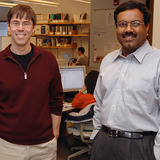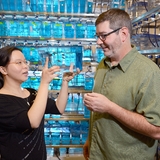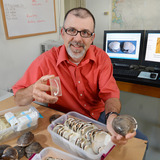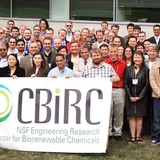News Archive
Friday, October 19 2012
-
ISU study: Aphid attacks weaken genetic defenses in soybeans, may open door for other pests
Aphids possess a unique ability to block the genetic defense response of soybeans and may open the door for other pests to do even more damage to crops, according to a recent study by researchers at Iowa State University. The paper found that aphids essentially can short-circuit the hormonal defense mechanism in soybeans meant to combat insect infestations, making it easier for other pests, such as the soybean cyst nematode, to colonize the plant as well.
-
Evolving microbes help Iowa State engineers turn bio-oil into advanced biofuels
A research team led by Iowa State University's Laura Jarboe is working to develop hungry, robust microbes that can ferment biofuels from the bio-oil produced by rapidly heating biomass such as corn stalks and sawdust. It's all part of Iowa State's efforts to combine two conversion paths -- thermochemical and biochemical -- to find efficient ways to produce renewable fuels and chemicals.
-
Search begins for Iowa State's next business dean
Senior Vice President and Provost Jonathan Wickert has identified an 18-member search committee to seek a successor to Labh Hira, who retired as College of Business dean in March and currently serves as interim president of the ISU Foundation.
-
Swine Medicine Education Center receives federal grant to advance mission
A federal grant announced this week will help to propel Iowa State University’s Swine Medicine Education Center (SMEC) from a regional presence to a national leader that will attract veterinary students from across the country. The three-year, $713,847 Higher Education Challenge Grant from the U.S. Department of Agriculture will transform SMEC into a national center of excellence and a resource for providing unparalleled hands-on opportunities to veterinary students who want to specialize in swine medicine.
-
Iowa State researchers developing ‘BIGDATA’ toolbox to help genome researchers
The latest DNA sequencing technology is burying researchers in trillions of bytes of data. Iowa State's Srinivas Aluru is leading a team of researchers who will develop high performance computing tools to help researchers analyze all that data. The work is supported by a $2 million grant from the BIGDATA program of the National Science Foundation and the National Institutes of Health.
-
Student wins scholarship for essay on her tsunami-survival experience
Onalie Ariyabandhu's essay about her family’s harrowing experience during the Sri Lanka tsunami in 2004 won her a $2,500 essay from the 2012 International Student Voice magazine sponsored by International Student Protection. She is a sophomore majoring in economics, international studies and environmental studies. More than 700 international students studying abroad entered the competition with essays about an experience from their lives and how it influenced who they are today.
-
ISU researchers advancing gene targeting techniques in new paper published in Nature
Iowa State University researchers are helping to advance new techniques that allow scientists to site-specifically mutate and edit the genes of living organisms. The innovation could have sweeping applications in agriculture and the study of human disease.
-
Iowa State researchers study clam shells for clues to the Atlantic’s climate history
Iowa State University's Alan Wanamaker studies the growth increments in clam shells to learn about past ocean temperatures, growing conditions and circulation patterns. Wanamaker says a better understanding of the ocean's past can help researchers understand today's climate trends and changes.
-
NSF adds three years, $12 million to ISU-based Center for Biorenewable Chemicals
The National Science Foundation (NSF) has added $12 million and another three years of support to the NSF Engineering Research Center for Biorenewable Chemicals based at Iowa State University. The continuing support brings federal investment in the center up to $30.5 million over eight years. The center's vision is to transform the industrial chemical industry from one based on petroleum to one based on biorenewable resources.
